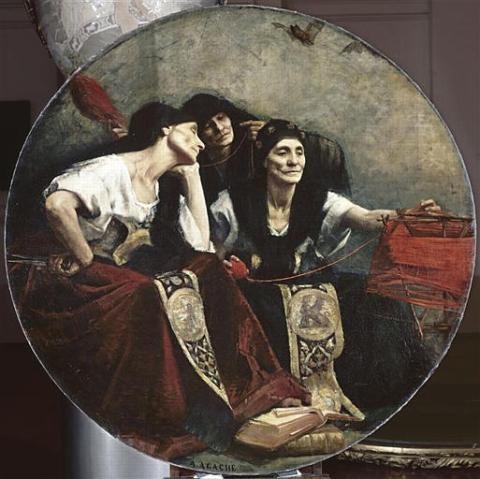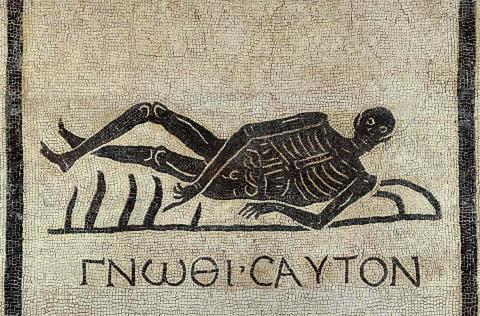Nōvit paucōs sēcūra quiēs,
quī vēlōcis memorēs aevī175
tempora numquam reditūra tenent.
dum fāta sinunt, vīvite laetī.
properat cursū vīta citātō,
volucrīque diē
rota praecipitis vertitur annī;180
dūrae peragunt pēnsa sorōrēs
nec sua retrō fīla revolvunt.
at gēns hominum fertur rapidīs
obvia fātīs incerta suī;
Stygiās ultrō quaerimus undās.185
nimium, Alcīdē, pectore fortī
properās maestōs vīsere mānēs.
certō veniunt tempore Parcae.
nūllī iussō cessāre licet,
nūllī scrīptum prōferre diem;190
recipit populōs urna citātōs.
Notes
Few people enjoy carefree peace, because they do not hold onto each passing moment, instead rushing towards their fate and shortening an already short life. The Chorus uses Hercules’ journey to the Underworld as an example of this problem.
174 Seneca takes a conventional thought (“few people enjoy peace free from cares”) and makes it more striking by turning the expected subject into the object (paucōs) and the expected object into the subject (quiēs).
175 vēlōcis memorēs aevī: memor is commonly followed by an objective genitive (AG 349). aevī probably refers to an entire life or lifespan, while the plural tempora in the next line refers to the individual moments that make up a life. The only people who find peace are those who are “mindful of” the swift passing of time, and therefore hang on to all the moments in their life before they are lost. This idea is found throughout Greek and Latin literature, perhaps most famously in Horace’s exhortation, carpe diem (Odes 1.11.8).
176 numquam reditūra: Seneca repeats the future active participle of redeō that he used in line 136 to describe the rising of the moon after it had set. Unlike the never-ending cycles of nature, the moments of a human life do not return once they have passed by.
177 dum fāta sinunt: expressions like this can be found in similar contexts in other Latin poets. For instance, Tibullus encourages his girlfriend Delia to enjoy their love before they grow old and die: intereā, dum fāta sinunt, iungāmus amōrēs (“meanwhile, while the fates allow it, let’s join in love,” 1.1.69). vīvite laetī: the adjective is predicative, describing how people should live (translate as an adverb). The chorus is addressing both the audience of the play and human beings in general.
178–82 Seneca continues to elaborate on the rapid, unidirectional nature of life. He enlivens this standard theme with frequent alliteration (especially “p”, “c”, “v”, and “r”) and a series of rapid, anapestic words or phrases to express the idea of “speed” onomatopoeically (properat, volucrīque diē, rota praecipitis).
read more
The imagery in this passage shifts fluidly. The “rapid course” of life in line 178 suggests a speeding chariot–perhaps the flying chariot of the sun that drives on the “winged day” (179). rota at the start of the next line again suggests a chariot, but by the end of the line transforms into the common image of the cycle of the year. At the end of the passage, that eternally spinning wheel gives way to the Fates’ balls of wool, which cannot be wound up again after they have been spun out.
179 volucrīque diē: “and with each swiftly passing day.” Readers might initially connect this phrase with properat in the previous line, as a second ablative after cursū … citātō; further reading reveals that the phrase modifies 180 vertitur. Thus, the second clause of the sentence seems to start before the first clause has finished, illustrating Seneca’s theme of time passing quickly.
180 vertitur: the passive of verbs like vertō, vertere often has a middle sense: the wheel of the year “turns itself” or simply “turns.”
181–82 The durae sorōrēs are the three Fates.
read more
Several mythologies imagined human life as threads controlled by the spinning and weaving of three sisters: the Moirai in Greece (Clotho, Lachesis, and Atropos), the Parcae in Rome (Nona, Decima, and Morta), the Norns in Norse mythology (Urðr, Verðandi and Skuld). Latin poetry often refers to the Fates either as sorōrēs or by their Latin name, Parcae (see line 188), but when referring to individual sisters uses their Greek names.
181 pēnsa: a pēnsum was a quantity of wool “weighed out” (from pendō pendere pependī pēnsum) or allotted for a day’s worth of spinning. Here, it is the amount of the Fates’ wool that represents a human life.
182 revolvunt: with a basic sense of “roll back/again,” this verb can describe either unrolling or rolling back up. Here, it means the latter: the natural direction in spinning is to unwind the ball of wool, and the Fates will not go backward (retrō) to wind it up again.
183–84 fertur rapidīs / obvia fātīs: at first rapidīs … fātīs may look like an ablative after fertur (“is carried by swift fates”), and we may let this sense linger in our minds. But further reading shows it to be a dative after obvia: the race of humans “rushes to meet swift fates/deaths.” ferō, ferre is often used in the passive (or reflexive: sē ferre) to mean “rush.”
184 incerta suī: the adjective modifies gēns and is often followed by an objective genitive (AG 349). Seneca is referring to humans’ general ignorance of their nature and best interests. Various ancient philosophies and religions promised to combat this ignorance; most famously, the maxim gnōthi seauton (in Latin, noscē tē ipsum; in English “know thyself”) was inscribed on the Temple of Apollo at Delphi, and invoked repeatedly by thinkers from Plato onwards.
185 Stygiās … undās: the River Styx formed the boundary to the Underworld and was its most famous river; as such, it is often used metonymically by poets to refer to the Underworld in general. This exact phrase is found in several poets before Seneca. ultrō: “voluntarily,” “of its own accord.”
186 nimium: modifies fortī. Alcīdē: the patronymic derives from Hercules’ paternal grandfather, Alcaeus. It uses a Greek declension, with a vocative in –ē (AG 44).
187 properās … vīsere: the infinitive of purpose is much more common in poetry than prose (AG 460). properās is repeated from line 178 (properat cursū vīta citātō), underscoring the Chorus’s argument: human life is short, but the reckless daring of humans shortens it even further.
188–91 The Chorus’s point is that death comes quickly and cannot be avoided (this repeats the theme of lines 178–82), and so it is foolish for mortals in general, and Hercules in particular, to rush towards their fate (the theme of lines 183–87). Word repetition underscores these connections. The human race lives in ignorance (184 incerta suī) and so hurries towards a death whose time is already fixed (188 certō ... tempore). Life passes by with a “hurried course” (178 cursū ... citātō) and the result is people “hurried” to their death (191 populōs ... citātōs).
188 Parcae: the Fates (see 181–82n.).
189–90 The second line restates the idea of the first (this sort of theme and variation is very common in poetry). To illustrate the connection between the lines, Seneca uses anaphora of nūllī, and the same syntactical construction in each line: licet followed by an infinitive (indicating what is permitted to be done) and dative (indicating who is permitted to do it).
189 nūllī iussō cessāre licet: “no one may delay once ordered (to die).” iussō is a dative modifying nūllī.
190 Supply licet from the previous line. scrīptum … diem: “the appointed day.” scrīptum probably does not allude to a “book of fate” or anything similar, since the Fates were typically represented as spinners and weavers. Rather, it is a word often used to describe formal decrees or agreements.
191 urna: this may refer to a funerary urn, but it could also be connected to the urn used by the three judges of souls in the Underworld (Minos, Rhadamanthus, and Aeacus) to hold the names of the dead. citātōs: “rushed,” i.e., “all too soon.”
Vocabulary
quiēs quiētis f.: rest, peace
vēlōx vēlōcis: fast
memor memoris: remembering; mindful of (+ gen.)
citātus –a –um: swiftly driven, hurried; quick, excited
rota –ae f.: wheel
praeceps praecipitis: headlong; downhill, steep; quick, speedy
peragō peragere perēgī perāctum: to pierce, carry through; finish
pēnsum –ī n.: an allotment of wool for spinning; an allotted amount of spinning
retrō: backwards
fīlum –ī n.: thread, string
revolvō revolvere revolvī revolūtus: to roll back; unwind or rewind; revolve; review
rapidus –a –um: swift
obvius –a –um: in the way, so as to meet, meeting (+ dat.)
incertus –a –um: uncertain
Stygius –a –um: Stygian; pertaining to Styx (river)
ultrō: furthermore, beyond; voluntarily
nimium: excessively
Alcīdēs –ae. m.: a descendant of Alcaeus; Hercules
vīsō vīsere vīsī vīsus: to visit, go to see; look at
mānēs mānium m. pl: souls or ghosts of the dead
Parca –ae f.: the Fates
cessō –āre –āvī –ātus: to delay; cease; be idle
prōferō prōferre prōtulī prōlātus: to bring forth; extend, prolong; offer; defer; reveal, publish
urna –ae f.: urn
citātus –a –um: swiftly driven, hurried; quick, excited


